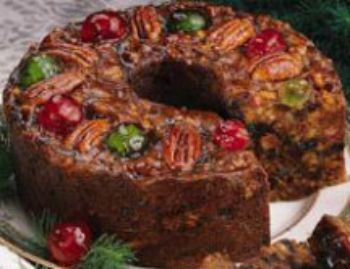Fruitcakes are holiday and wedding cakes which have a very heavy fruit content. They require special handling and baking to obtain successful results. The name “fruitcake” can be traced back only as far as the Middle Ages. It is formed from a combination of the Latin fructus, and French frui or frug.

The oldest reference that can be found regarding a fruitcake dates back to Roman times. The recipe included pomegranate seeds. Pine nuts, and raisins that were mixed into barley mash. Honey, spices, and preserved fruits were added during the Middle Ages. Crusaders and hunters were reported to have carried this type of cake to sustain themselves over long periods of time away from home.
1400s – The British began their love affair with fruitcake when dried fruits from the Mediterranean first arrived.
1700s – In Europe, a ceremonial type of fruitcake was baked at the end of the nut harvest and saved and eaten the next year to celebrate the beginning of the next harvest, hoping it will bring them another successful harvest. After the harvest, nuts were mixed and made into a fruitcake that was saved until the following year. At that time, previous year’s fruitcakes were consumed in the hope that its symbolism would bring the blessing of another successful harvest
In the early 18th century, fruitcake (called plum cakes) was outlawed entirely throughout Continental Europe. These cakes were considered as “sinfully rich.” By the end of the 18th century there were laws restricting the use of plum cake.
Between 1837 and 1901, fruitcake was extremely popular. A Victorian “Tea” would not have been complete without the addition of the fruitcake to the sweet and savory spread. Queen Victoria is said to have waited a year to eat a fruitcake she received for her birthday because she felt it showed restraint, moderation and good taste.
It was the custom in England for unmarried wedding guests to put a slice of the cake, traditionally a dark fruitcake, under their pillow at night so they will dream of the person they will marry.
Fruit Cake Recipes:

One Response to “Fruitcake History”
Barbara Lacy
Fascinating history. . .I have been looking for it. . .